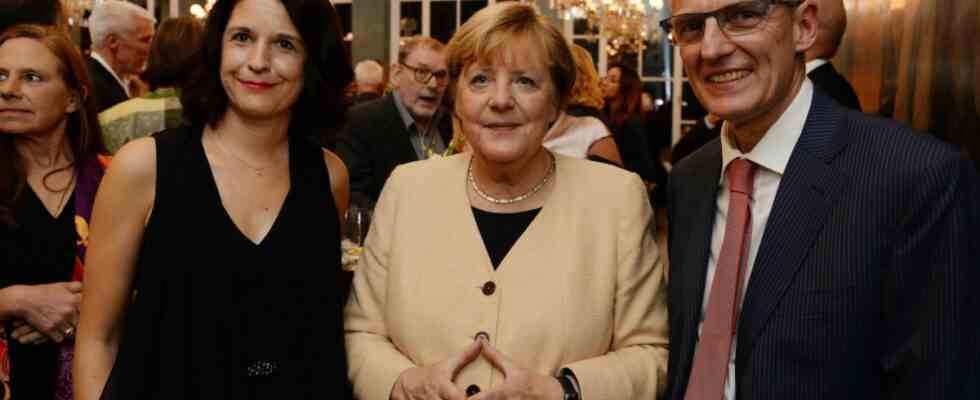It’s starting out really well. At the beginning of this festive evening in Munich’s Gärtnerplatztheater, the readers have the floor. All those for whom reading the newspaper is a ritual, a necessity, a pleasure, sometimes a nuisance. The big celebration of the 77th birthday of the SZ on Thursday evening with many prominent guests would not have been possible without critical feedback – that’s why the editors Roman Deininger and Max Hägler are now on the stage. They are staging a review of letters to the editor, which is also a bow: the opinionated SZ audience has high standards, as the author of an article you always have to be prepared for every mistake to be registered and denounced immediately – the 50,000 letters that reach the editors every year are a salutary corrective.
Deininger and Hägler present the most brilliant rebukes and humorous contributions from the SZ readers in abridged form. Which requires some effort, because an eulogy looks different: “If you have nothing to say, then you have to have the courage not to write anything,” Deininger quotes from a letter.
Every year, the SZ editorial team receives 50,000 letters, the editors Roman Deininger (left) and Max Hägler read some particularly humorous articles.
(Photo: Alessandra Schellnegger)
And you can learn something else from this performance: that the artfully composed stories trigger completely different reactions in the audience. For example, a three-page story about the Bavarian prime minister met with considerable displeasure from a reader because Markus Söder was referred to there as “Hallodri”. Another found the portrait, which dealt with the prime minister’s crisis management at the height of the pandemic, extremely strange and far too friendly: that was pure whitewashing, the Bavarian State Chancellery could not have written it better!
Of course the southern german also celebrates itself in their schnapps year. In his welcome address, managing director Christian Wegner points out that the SZ has never had as many subscribers as it currently has, the printed and digital editions together; despite the skyrocketing paper prices, this is cause for hope. The two editors-in-chief, Judith Wittwer and Wolfgang Krach, will lead through the two-hour program, with musical support from the Staatstheater-Orchester conducted by Anthony Bramall. The overture to Johann Strauss’ “Fledermaus” has almost something programmatic – basically cheerful, occasionally dramatic, pointed and energetic.
To call Markus Söder’s performance lively would almost be an understatement. The prime minister spiced up his welcoming speech, which became cabaret-style and caused hilarity in the hall, with a multitude of precisely placed taunts. First of all, Söder praises the SZ for its modesty in celebrating in such a setting – at 19 degrees, with energy-saving lamps and vegan food in the modest hut on Gärtnerplatz. A perfect ambience, after all, the SZ high-rise in the east of Munich is also known as the “temple of humility”.
Bavaria’s Prime Minister Markus Söder once worked as a journalist for Bayerischer Rundfunk – but that doesn’t stop him from precisely placed taunts.
(Photo: Robert Haas)
However, they could southern german definitely show a little more Bavarian patriotism. What Markus Söder probably means, more love for the CSU, which for a long time only had to fear a real opposition in Bavaria, namely the SZ. However, he does not have high hopes in this regard. But that might also be a good thing. “Governing Bavaria would be much too easy without the SZ,” says the speaker and promises: “We will do everything we can to ensure that you don’t get bored.”
Former Chancellor Angela Merkel gives a speech in which she draws a wide arc from the post-war period from 1945 to the Russian war of aggression in Ukraine. What is remarkable is her assessment that Putin’s aggressive speeches should not be interpreted as intimidating rhetoric, but should be taken seriously in substance. And that the newly ignited Cold War could not be permanently ended without Russia. She vividly tells of the happiness of reunification, which was also the starting point of her political career, and of the not exactly easy years as a young federal minister for women and youth – at that time she was not only considered “Kohl’s girl” by the editors of the SZ. The mutual respect between her and the capital’s journalists probably grew over the years of the chancellorship, at least by Merkel’s standards it sounds almost affectionate when she talks about her daily SZ reading. Sometimes she also remembers a single sentence – such as that from an essay about the art of ending a career in style (“Runter vom Platz”). The fact that quitting is an important part of the task, she was very moved by this realization in 2019, when she by no means gave up the CDU presidency lightly.
With appetizers and wine on all floors of the theater, you then meet many guests who claim to have grown up with the SZ – the former BR director and former spokesman for the Federal Chancellor, Ulrich Wilhelm, for example. Or ex-Prime Minister Edmund Stoiber, who has experienced 65 of 77 SZ years as a reader. The cabaret artist Luise Kinseher wishes that evening “that in fifty years one can still say: journalism, as practiced by the SZ, is a craft that requires knowledge, ability and empathy”. What then of course should not be missing: the readers who are lovingly connected to their SZ. And who always protest eloquently when they discover something they don’t like at all.

